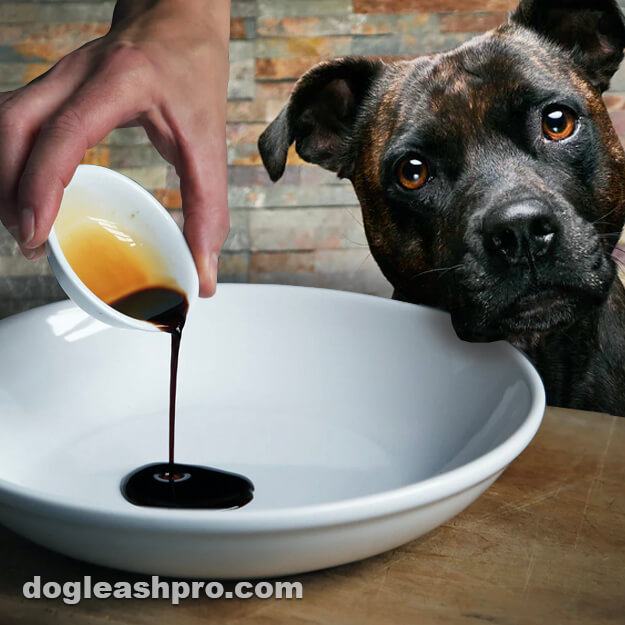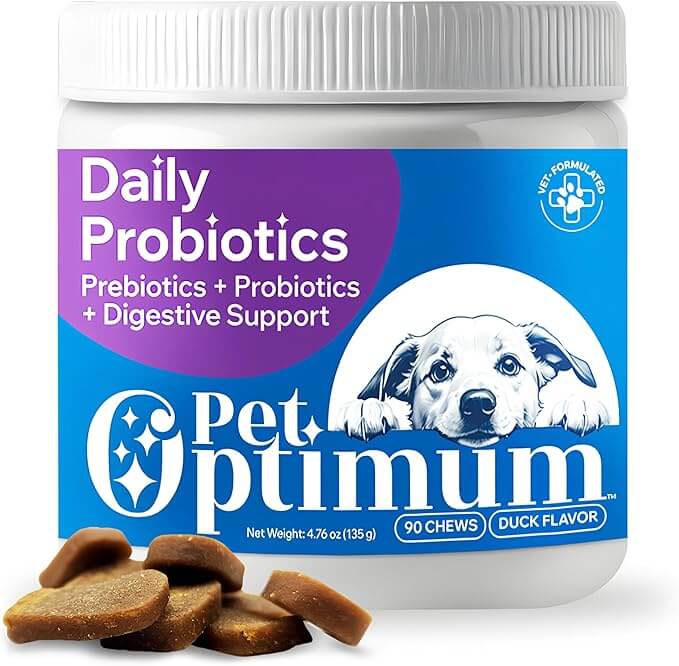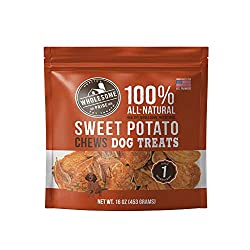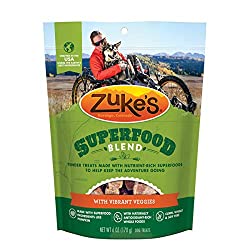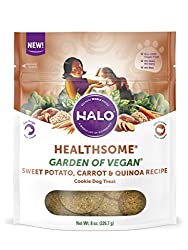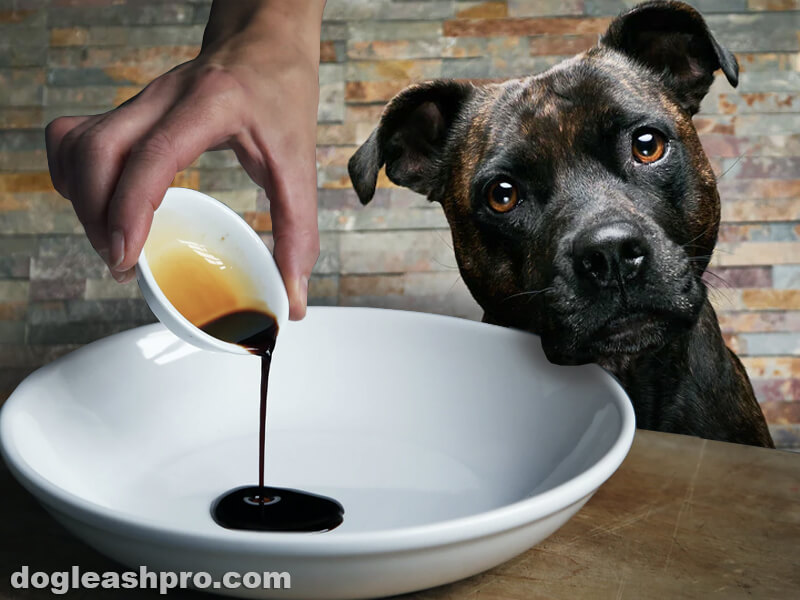
You’re probably drizzling a little bit of Balsamic vinegar on your chicken dish, salad, steaks, or fresh fruits right now and wondering if this smoky and sweet condiment is safe for doggy consumption. You’ve clicked on this article to find the answer to this question.
Can dogs eat Balsamic vinegar? No, dogs should not eat Balsamic vinegar. While dogs can tolerate Balsamic vinegar in small amounts, this condiment is toxic in higher proportions due to the ingredients used, which can cause toxicity in dogs.
Table of Contents
Is Balsamic vinegar bad for dogs?

Balsamic vinegar is not natural dog food and can be harmful in large quantities. Dogs can withstand this condiment in tiny amounts, but there is no reason to feed it to your furry friends intentionally.
Let’s take a look at what goes into making Balsamic vinegar and why it is unfit for canine consumption.
1. Grape must is toxic to dogs
Classic Balsamic vinegar is made using only one ingredient: grape must. Grape must is a mixture of grape juice, stem, skin, and seeds.
Grapes are highly toxic to dogs. Exactly what makes grapes and raisins poisonous to our canine buddies is still unknown. This is why veterinary experts haven’t come up with a safe way for dogs to eat grapes.
While most experts believe the toxic proportion to be 1.8 grapes per pound of the dog’s body weight, grape toxicity varies from dog to dog.
Grape toxicity can lead to:
- Lethargy.
- Weight loss.
- Loss of appetite.
- Dehydration.
- Kidney failure.
2. Red wine vinegar is harmful to dogs
Commercially available Balsamic vinegar is mixed with red wine vinegar to speed up the fermentation process. Like Balsamic vinegar, red wine vinegar comes from grapes. Feeding it to your furry friends can lead to symptoms similar to grape poisoning.
In addition, the high acidity of red wine vinegar can cause:
- Gastric irritation.
- Acidity.
- Diarrhea.
- Vomiting.
- Difficulty swallowing.
3. Caramel can cause health problems in dogs
Low-cost Balsamic vinegar has caramel or sugar syrup added to imitate the color and consistency of the real deal. Dogs don’t need sugary condiments in their diet.
Excessive sugar consumption can lead to:
- Stomach soreness.
- Change in appetite.
- Tooth decay.
- Hyperglycemia or elevated blood sugar.
- Obesity.
- Diabetes.
Handy Hint: When it comes to your dog’s health and safety, it’s best to avoid feeding him grapes at all costs. If you’re eating candies like Fruit Snacks that contain concentrated grape juice, please do not feed that to your canine companions.
What is Balsamic vinegar?
Balsamic vinegar is a dark, sweet, tangy, and rich-tasting vinegar used as a salad dressing, condiment, and sauce.
Where does Balsamic vinegar come from?
Traditional Balsamic vinegar is made exclusively in Italy and is sold in select stores. Commercially available Balsamic vinegar is cheaper and doesn’t necessarily come from Italy.
What is Balsamic vinegar made of?
Traditional Balsamic vinegar contains grape must as its only ingredient. Grape must is the sweet grape juice with stem, seeds, and skin. Commercially available variants may contain red wine vinegar, corn starch, syrup, and artificial colors.
How is Balsamic vinegar made?
Traditional Balsamic vinegar is made by boiling and concentrating grape must and storing it in wooden casks. The concentrated must ferment into alcohol and then acetic acid. The process takes at least 12 years, making original Balsamic vinegar an expensive delicacy.
An easier and cheaper process involves mixing grape must with red wine vinegar. This speeds up the fermentation and the vinegar is ready in as little as a few months. Commercially available Balsamic vinegar is made this way.
Some cheaper variants skip the grape must and use artificial color and syrup mixed with plain white vinegar.
When shouldn’t you feed Balsamic vinegar to your dog?

Ideally, you shouldn’t feed Balsamic vinegar to your dog at all. However, if you want to give your furry buddies Balsamic vinegar, make sure they do not have any preexisting health conditions or sensitivities to this condiment.
Balsamic vinegar has high acidity, making it unfit for canines with sensitive stomachs. Acidic drinks and foods can cause heartburn and acid reflux in dogs.
If your canine companion is old, pregnant, or has weak kidneys, you should treat them with utmost care and never feed them anything that can stress their organs.
Does Balsamic vinegar provide nutritional value to dogs?
The quantity of Balsamic vinegar that is considered safe for dogs isn’t enough to give them any nutritional benefits. Pure Balsamic vinegar contains more or less the same nutritional benefits as grapes. Unfortunately, this also means it retains the toxicity from grapes as well.
It’s better to seek the nutritional benefits of Balsamic vinegar from safer sources; there is no need to give dogs Balsamic vinegar.
What if my dog accidentally ate Balsamic vinegar?

If your canine companion has ingested any food laced with Balsamic vinegar, seeking immediate veterinary help can prevent grim consequences. Waste no time in calling the vet as soon as your pup consumes any toxic food.
Any poisonous ingredient is best flushed out before it gets digested by the dog. For that, you may need to induce vomiting. Ask your vet the best way to do that. Rinse the dog’s mouth with water afterward to wash off any toxic residue.
Your vet may ask you to bring your furry friend in for a checkup so he or she could handle the process. Sometimes, it is best to let the veterinary professional handle it so there are no procedural accidents.
Accidentally ingesting food that contains Balsamic vinegar can put your furry friends at risk of the following health problems.
Acidity
Balsamic vinegar is one of the more acidic kinds of vinegar. Eating acidic foods can cause acid reflux and low pH levels in dogs. If left untreated, this condition can cause permanent damage to the gastrointestinal tract.
Symptoms of acidity are:
- Reduced hunger.
- Vomiting.
- Excessive burping.
- Bad breath.
- Pain swallowing.
- Heartburn.
Acid reflux is curable without hospitalization. The vet may prescribe the needed medicines that you can administer at home. In more severe cases, your canine companion may require a diet change. Sometimes, acid reflux is a symptom of a more serious underlying problem that must be treated first.
Kidney failure
Kidney failure can happen due to the presence of grapes in Balsamic vinegar. Grape poisoning is unpredictable and affects some dogs more than others. Severe grape poisoning can lead to acute kidney failure. Symptoms that your dog is suffering from kidney failure are:
- Bad breath.
- Weight loss.
- Lethargy.
- Loss of hunger.
- Blood in the urine.
- Seizure.
- Loss of coordination.
Acute kidney failure treatment requires prompt action and timely medical care. The vet may keep the dog under observation and administer antibiotics, medication, and fluid therapy. If the kidneys have suffered severe damage, the dog would need dialysis.
Handy Hint: We recommend feeding your pups healthier food options like the gluten-free and protein-packed Amaranth. Doing so will ensure that your furry friends have the vitamins, minerals, and dietary fiber that they need.
Lead poisoning
Balsamic and red wine vinegar both contain trace amounts of lead. The quantity isn’t a cause for alarm for humans. However, dogs are much smaller than us. Due to this, lead poisoning is a possibility in dogs that consume Balsamic vinegar regularly or drink lots of it at once.
Symptoms of lead poisoning are:
- Vomiting.
- Stomach pains.
- Lethargy.
- Seizures.
- Loss of coordination.
- Loss of appetite.
The dog may require a blood test to find out the level of lead in their blood. In severe cases, they may need surgery. If the dog has just ingested lead, the vet may induce vomiting or perform an endoscopy to help the dog expel the toxins. They may still need veterinary care after getting rid of the toxic substance.
Tooth decay
Commercial Balsamic vinegar may have sweeteners added for color and flavor. Dogs don’t have the enzyme in their saliva to breaks down sugar. That, and the high acidity of Balsamic vinegar, contributes to the risk of tooth infection and cavities in dogs, signs of which include:
- Discoloration of teeth.
- Bad breath.
- Abnormal drooling.
- Bleeding or swollen gums.
- Difficulty chewing.
You can prevent tooth problems in your pooch by ensuring oral hygiene. Daily brushing, avoiding acidic foods and sugary snacks, and regular dental checkups maintain proper dental health in dogs.
Once tooth decay has occurred, you need to visit the vet. Treatments include antibiotics, anti-inflammatory medicine, and sometimes, dental surgery.
Hyperglycemia
Store-bought Balsamic vinegar is laced with syrup and can cause hyperglycemia or increased blood sugar in dogs. Eating sugary foods can also lead to obesity and diabetes.
Symptoms of high blood sugar in dogs are:
- Wounds not healing.
- Red eyes.
- Noticeable weight change.
- Hyperactivity.
- Increased thirst.
- Increased urination.
Dogs showing symptoms of hyperglycemia need to avoid all sugary foods. Ideally, the elevated blood sugar will return to normal in a day or two. If the condition has damaged the pancreas or has caused diabetes, the dog may need hospitalization.
The vet will administer insulin and change the diet of a diabetic dog. Pancreatic damage is treated with IV fluids, anti-inflammatory drugs, and hospitalization.
Substitute for Balsamic vinegar that is dog-friendly
Considering how dogs do not need to eat Balsamic vinegar, here are some non-toxic and healthy alternatives for your canine buddies.
Apple cider vinegar (ACV)
Apple cider vinegar (ACV) is not only safe, but also improves fur quality, digestion, and immunity. Dogs that eat a high-grain diet may have a high pH level, leading to urinary infections, kidney stones, and allergies. Being slightly acidic, ACV helps reduce the pH to normal levels.
Coconut
Coconut makes an excellent treat for your canine companion. It improves coat quality in dogs and makes their fur shinier. It also improves oral health and can cure bad breath, skin irritation, and flea allergies.
Sardines
Sardines are rich in vitamins, minerals, protein, and good fats. Unlike other fish whose prickly bones can hurt your dog, sardine bones are soft and easily digestible.
Honey
Honey is thick, syrupy, sweet, and organic, which makes it the perfect dessert for your dog. This superfood is rich in minerals, multiple vitamins, as well as antioxidants. If your furry family member loves sugary treats, give them honey instead.
Sauerkraut
Sauerkraut is full of probiotic goodness. This fermented condiment improves gut health, increases immunity, decelerates cell-aging, and helps fight nasty bacteria in your doggy’s gut.
If you don’t have sauerkraut, but would like a probiotic supplement for your furry friends, we recommend this one for them:
How do I make apple cider vinegar for my dog at home?
You can make safe and healthy apple cider vinegar (ACV) at home using nothing but water, apple bits, and honey. Apple skins and cores—stuff you usually throw away—make the best raw material for ACV.
Place the apple scraps in a clean jar and fill it with clean cool water. Mix a tablespoon of honey and seal the jar with a cloth and rubber band. Place it in a dark cabinet.
After 3 to 4 weeks, throw away the apple bits and leave the jar in the dark for another month. All-natural, homemade apple cider vinegar is ready for you and your canine companion.
If you don’t have time to make this, we get it! We feed our two furry family members these dog friendly treats and they both love it!
So, can dogs eat Balsamic vinegar?
Balsamic vinegar is another human food that is unfit for canine consumption. While a little bit of Balsamic vinegar usually does not hurt, it’s best not to risk sickness or potential toxicity in your dogs. To save your furry friends from any possible discomfort, keep this condiment out of their reach.
Related Questions
No, dogs should not eat food made with Balsamic vinegar, unless the food has very little Balsamic vinegar.
No, dogs should not eat pork with Balsamic vinegar. Rinse the pork with water to wash off the Balsamic vinegar before feeding it to your dog.
Not all vinegars are toxic to dogs. For example, apple cider vinegar is safe for canine consumption.
Yes, Balsamic vinegar is toxic to dogs. In large quantities, this condiment can cause grape poisoning in dogs.
Yes, you can give your pooch apple cider vinegar, which can treat certain stomach ailments in dogs.
Dogs do not necessarily like vinegar. Vinegar has a strong, sour scent which some dogs might find repulsive.
No, dogs should not have red wine vinegar. While it’s harmless in small amounts, red wine vinegar is not suitable for dogs.
DISCLAIMER: THIS WEBSITE DOES NOT PROVIDE MEDICAL ADVICE
The information, including but not limited to, text, graphics, images and other material contained on this website are for informational purposes only. No material on this site is intended to be a substitute for professional veterinary advice, diagnosis, or treatment. Always seek the advice of your veterinarian or other qualified health care provider with any questions you may have regarding dietary needs.
Resources:
https://en.wikipedia.org/wiki/Balsamic_vinegar
https://en.wikipedia.org/wiki/Must

With over five years of specialized experience as an animal writer, my expertise lies in dog nutrition, health, behavior, grooming, and training. I am dedicated to delivering helpful and informative content that caters to the well-being of our furry friends. My primary goal is to empower pet owners with knowledge and ensure our canine companions thrive in health and happiness. In my free time, I love volunteering at local dog rescue centers.
